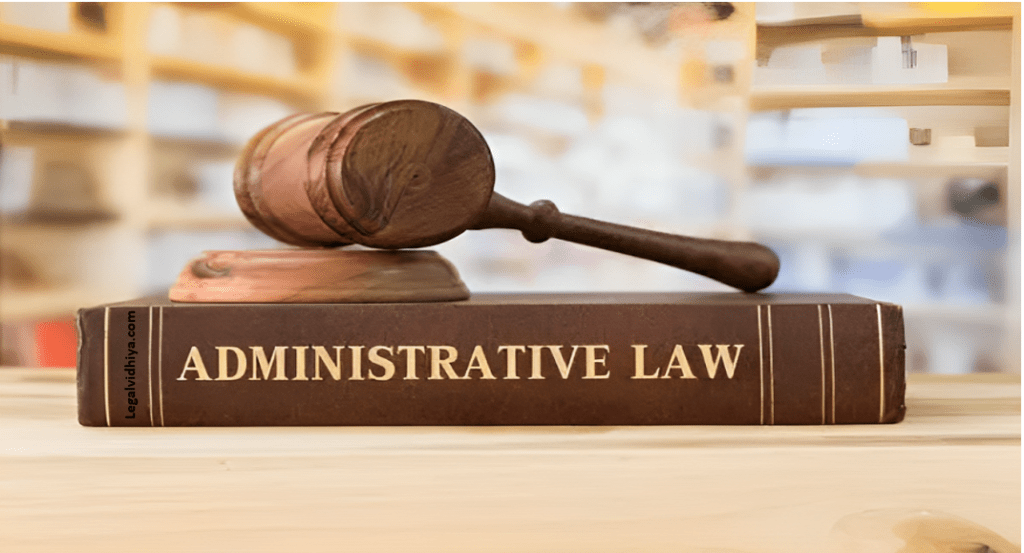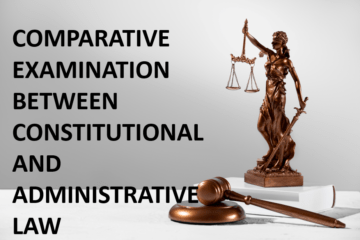
This article is written by Priya Das of 5th Semester of Bikash Bharati Law College, University of Calcutta, an intern under Legal Vidhiya
Abstract:
In a democratic country like India where education, manufacture, equal pay for equal work, essential needs, security of citizens, changing of social, economic and political paradigm are needed for the development of the country there such kind of development is made with the growth of administrative law. Administrative Law is the most important phenomenon for the welfare of the State. It is the law which governs the activities of administrative authorities which include executive branch of government. Administrative law is the branch of public law which maintains the relationship between individual and the government. The main objective of the administrative law is to protect the citizen from the abusive power made by the government. It is the law which limits the rule making and power of adjudication and enforcement of laws of those administrative authorities.
Keywords: Government policy, executive branch of government, enforcement of laws, citizens, administrative law, democracy, agencies, courts, quasi-judicial body.
Introduction:
Administrative law is considered as branch of public law which determines the power, duties of administrative agencies. This law governs the executive department of government and controls the rule making power of government which helps to reduce the misuse of powers of government. It deals with power structure of administrative and organisation and quasi-judicial authorities to enforce laws and keep the executive and its various agencies within the limits of their power. The procedure followed in exercising the powers and discharging the duties and the remedies available to the person whose rights are affected by any administrative action.
Administrative law is derived from the executive branch and is governed by the Administrative Procedure Act, which specifies how agencies create and enforce their rules and regulations in order to protect the interests of people as it interacts with government.
Definition:
Administrative law is the law relating to the administration carried by the administrative agencies which are called as executive department of government. There is no universal definition is given of administrative law. There is a considerable divergence of opinion on the definition of administrative law and this is due to wide range of increase in administrative process. So far it is difficult to find any one definition which can cover whole range of administrative law.
Here are several definitions by different scholars:
Ivor Jennings defined administrative law as it is connected with administrative authority in his book “The law and the constitution, 1959”.
Jennings has defined Administrative Law as the law relating to the administration and it determines the organization, powers, and duties of administrative authorities. This is the most accepted definition, but there are several difficulties:
- There is not mentioned any distinction between administrative law and constitutional law.
- This definition includes the power and function of administrative authority and also the substantive aspect of such powers but it doesn’t cover by the ambit of administrative law.
According to K.C. Davis, the power and functions of administrative agencies are regulated by administrative law and it ensures judicial review of agencies actions.
According to Austin, administrative law determines the ends and modes in which the sovereign powers are exercised either directly by the monarch or sovereign member, or by the subordinate political superiors to whom portions are delegated.
Bernard Schwartz defines Administrative Law as it is the law which applicable to those administrative authorities which possess of delegated legislation and ad judiciary authority.
Concept of administrative law:
Administrative law is the law to regulate administrative actions by controlling delegated legislation and it also subjects the administrative discretionary actions to judicial review. This law is that body of laws which applies for hearing before quasi-judicial bodies. Administrative law also determines the legality of government actions and particular acts authorize by the specific laws.
Meaning of administrative law:
There is particular definition is given to the administrative law. It sets the administer of administrative agencies. It creates the rules regulations for those agencies. Due to the increase of administrative agencies administrative laws also expanded. Administrative law ensures the protection of public interest and individual right. It makes liable to the administrative agencies for its actions. It exercises its authority within the framework. Administrative law enables to make rules regulations with consistent with law. It often involves in interpretation of statutes. As it has power to make laws but it derives its authority from the Constitution. It has a important role in maintaining the government actions and make fair and reasonable decision within bound of law. The increase of social welfare programs leads to increase administrative law. If any administrative actions affected individual rights, courts have power to challenge and make due process of law.
Features of Administrative Law:
There are several features of administrative law such as:
- Administrative law is a branch of public law which governs the actions of government agencies.
- Administrative law deals with the relationship between the government and it’s people through administrative agencies.
- Administrative law governs the function, powers, procedures of administrative agencies and enforce laws, regulations in various areas.
- Administrative authorities are accountable to both government and its people. The administrative agencies must make rules which is consistent with law.
- Administrative law protects public interest and justify the actions of administrative agencies.
Nature of administrative law:
Administrative law is a branch of public law which determines the relationship between the government and its citizen. The rights and liberties of the individuals must be protected by the Constitution of India. Administrative law is to protect the people in dealings with the public officials and to control the procedures by which the rights and liberties of people are enforced. The executive which exercises its functions are judicial and quasi-judicial. In order to reduce the burden of work of judiciary the administration is made. To give quick remedies to the people in those case which doesn’t take more times to solve the quasi-judicial body and quasi legislative bodies have those power.
Administrative law is a branch of public law, not like private law. It must make rules regulations by maintaining the rule of law. It creates the safeguard to the rights of people. It creates the checks to the agencies if their decision leads to arbitrariness. Judiciary can interpret the laws made by those authorities if there arise any ambiguity. It ensures the actions of administrative agencies must be beneficial to the people.
In India, administrative law is almost judge made law. Thus, it suffers from more facilities and benefits because of judicial lawmaking. Judiciary interprets law according to the need of time and issues guidelines for such. It affects administrative law and makes it stronger and more beneficial. It is a branch of the constitution that regulates all three branches i.e., legislative, executive and judiciary in the same way administrative regulates all administrative authorities and protects them from corrupt practices. Its main purpose is to focus on the judicial review of administrative actions.[1]
Scope of administrative law:
Administrative law is essential to ensure government actions and rule-making. It makes government accountable for its actions. The scopes of administrative law are:
- Administrative law creates rules regulations through administrative agencies.
- If there any conflict arises, it allows for judicial review in courts to ensure legality and reasonableness.
- Administrative law makes agencies accountable for wrong actions.
- Main scope of administrative law is to ensure democracy with fair and reasonable decision making.
- Administrative law allows public opinion which is incredible in order to secure public interest and to promote democracy.
- It has a crucial role in maintaining democracy and it gives priority to the public opinion which makes it more reasonable.
Several Important Case Laws which deal with Nature and Scope of Administrative Law are:
Ram Jawaya Kapoor v. State of Punjab [2]: In this case the Supreme court recognise the theme of responsible government and the Fundamental Right of the petitioner was violated or infringed. The Supreme Court held that the government actions did not amount to violation of the Art. 19(1) (c) and 19(1) (g). And also held that the Doctrine of Separation of Power isn’t limited to the severe division of power among different organs of the State such power required for governing rule.
Asif Hameed v. J&K [3]: In this case it was held that the Constitution does not permit the Court to direct or advise the executive in matter of policy or to sermonize qua any matter which under the Constitution lies with the sphere of legislature or executive, provided these authorities do not transgress their constitutional limits or statutory powers.[4]
Development of Administrative law:
Administrative law has a crucial role in maintaining the governance. It makes administrative agencies responsible for its work and regulates the administer of those agencies and also checks the work. With the expansion of administrative law leads to increase of social growth and also increase the responsibility of administrative agencies to their work. It makes the government more vulnerable.
- Welfare Of State
Administrative law is required for the welfare of State. It is not possible for the government to look after all the problems related to society. Welfare of State is the main concept for promoting administrative law. This branch of public law deals with the government and citizens they serve. Administrative law sets the operation of agencies in order to make the decisions reasonable. The main purpose of administrative law is to protect the rights of citizens, if individual rights are affected by law made by any agencies, then it required due process through notice of proceedings, fair decision making.
- Inadequate Legislative
With the increase in the functions of a democratic country, the workload and responsibilities of organs of government also increased. Legislature is not always able to make laws with needs of society. Thus, the Primary legislation has the power to delegate to government agencies and executive for making laws which also includes administrative agencies.
- Complexity:
In contemporary modern world it is necessary to administer the country with specialized equipment and regulatory framework which administrative agencies provides.
- Public interest:
One of crucial reason for rapid growth of administrative law is to protect and ensures the rights of individual by providing best interest to them.
- Establishment Of Courts
The judicial system was proved to be an inadequate to determine and settle all kinds of disputes. It was slow, costly, inept and complex. The judiciary was already overburdened, and it was not possible to expect fast disposal of even very important matters. The important problems could not be solved by mere interpretation of the provisions of some statutes instead they required consideration of necessary factors which could not be done by the standard courts of law. Therefore, industrial tribunals and labour courts were established, which possessed the techniques and proficiency to handle these complex problems. [5]
- Preventive Measures
Administrative law has preventive measures. It can’t delay in making decision like court. If there is any dispute arise, it tries to solve it as soon as possible. It makes administrative agencies more efficient and effective. Through its work it is more practical and helps to give quick remedies. But there is no supremacy, the decision made by those agencies must be rechecked by Court and must be acknowledged with Constitution. The court can reject the decision if it leads to malafide or infringes any act.
- Judicial review:
As administrative law allows judicial review if there is any violation of rights created by the administrative agencies action. Courts have power to review the actions of those agencies to solve the problem arise and make reasonable and justifiable decision.
- Technological advancement:
As the technology of world is more expertise day by day it requires specialized and more expertise government to maintain the administer. Administrative agencies are more technical expert in several cases which leads to its expansion.
Landmark judgements:
AIR India v. Nargesh Meerza[6]: In this case the Supreme Court struck down AIR India and Indian Airline regulations on the grounds that the regulations laid down on the pregnancy and retirement of Air-hostess were Unconstitutional. The court held that these regulations violate Article 14,19 and 21 of the Constitution of India and arbitrary in nature.
Delhi Transport Corporation v. D.T.C. Mazdoor Congress[7]: In this case it was held that the power of the authority to terminate the service of permanent employee by giving him a 3month notice held unconstitutional and void.
Conclusion:
Administrative law controls the functions and governs the administrative agencies and create limits in decision making. Administrative law is the complex filed of law which have crucial role in functioning government. It ensures public interest by making laws which are consistent with Constitution. It makes government accountable to its citizens for its actions. Administrative law governs the administrative agencies and its work and exercise their authority within this framework. Administrative agencies must have to follow rule of law. These agencies implement policies, rules in order to ensure the rights of people. Administrative law also plays a crucial role in maintaining the relation between branches of government by administering administrative agencies.
[1] Ibid
[2] Ram Jawaya Kapoor v. State of Punjab AIR 1955 SC 549, 1955 2 SCR 225
[3] Asif Hameed v. J&K, AIR 1989 SC 1899
[4] Definition, Nature, Scope and Significance of Administrative Law, LawBhoomi May 22, 2021 available at https://lawbhoomi.com/definition-nature-scope-and-significance-of-administrative-law/#Scope_of_Administrative_Law, last visited on 4th ocotober,2023
[5] Development Of Administrative Law In India, By Ana | Views 45901 available at https://www.legalserviceindia.com/legal/article-3776-development-of-administrative-law-in-india.html#:~:text=Small%20steps%20were%20taken%20by,Act%2C%201955%2C%20the%20Requisitioning%20and, last visited on 5th ocotober,2023
[6] AIR India v. Nargesh Meerza, 1981 AIR 1829, 1982 SCR (1) 438
[7] Delhi Transport Corporation v. D.T.C. Mazdoor Congress, 1991 AIR 101, 1990 SCR Supl. (1) 142




0 Comments